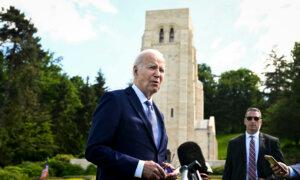Lawmakers submitted more than 1,300 amendments for the bill, 350 of which were ruled to be in order.
The House Rules Committee on Tuesday ruled in favor of advancing a House version of the 2025 National Defense Authorization Act (NDAA) for consideration before the full House of Representatives.
The committee issued its ruling on Tuesday evening after an hours-long hearing to consider the annual defense budget bill.
The House version of the NDAA comes in at more than $880 billion and currently includes continued funding for military aircraft, ships, vehicles, and weapons programs, as well as a 4.5 percent pay raise for U.S. service members, and around 15 percent in additional pay raises for some junior enlisted service members, bringing their overall pay boost to nearly 20 percent under this year’s budget.
Lawmakers submitted more than 1,300 amendments to the bill, of which the committee ruled 350 were in order.
The committee’s decisions could set the stage for a partisan fight as the Republican-controlled House and Democrat-controlled Senate eventually work to reconcile the differences in their separate versions of the bill.
Amendments
House Armed Services Committee Ranking Member Adam Smith (D-Wash.) issued a statement last week urging House Speaker Mike Johnson (R-La.) to “reject attempts to add poison pills or partisan riders” and strive for broad bipartisan support when passing the NDAA.
Of the 350 amendments the committee ruled in order, around one-fifth were offered exclusively by Democrats while the remainder were offered by either Republicans or bipartisan lawmakers.
Another Republican amendment would prohibit the DOD from contracting with entities that have engaged in boycotts of Israel, and to bar the department from selling products made by entities that boycott Israel at any of its commissary stores or military exchanges.
As the Tuesday House Rules Committee hearing drew to a close, Ranking Member Jim McGovern (D-Mass.) expressed disappointment that the committee ruled against around 85 percent of the amendments offered by Democrats. He noted that many of these included “quality, relevant proposals that this majority simply doesn’t want to receive a fair hearing.”
While some Democrats argued certain NDAA provisions and Republican amendments could undermine bipartisan support, several Republicans argued their efforts direct the military to focus on lethality, rather than “woke” policies.
White House Challenge
On Tuesday, the White House issued a statement of administration policy, signifying President Biden’s objections to several of the provisions within the bill.
The Biden White House expressed disappointment that the current version of the House NDAA provides $700 million less than the president requested for the annual shipbuilding budget and calls for funding one less ship than the president had hoped for in the 2025 defense budget.
President Biden also objected to a provision within the House bill calling for the U.S. Army to establish a drone corps component, arguing the provision would create an “unwarranted degree of specialization and limit flexibility to employ evolving capabilities.”
The White House said the president appreciates efforts to increase pay for junior enlisted troops “but strongly opposes making a significant, permanent change to the basic pay schedule” before the military completes its compensation review.
House Armed Services Committee Chairman Mike Rogers (R-Ala.) criticized President Biden for opposing targeted pay increases for junior enlisted troops.
President Biden also signaled his opposition to provisions within the House version of the NDAA that would limit DEI programs.
“The prohibitions regarding DEI efforts would impede DoD’s and Federal agencies’ ability to recruit and retain the diverse perspectives, experiences, and skillsets that are foundational to the strength of the Federal workforce,” the White House said. “Creating and supporting programs and policies that embrace DEI fosters workforce cultures that are inclusive of all individuals.”
The White House also faulted the House NDAA for not providing an increase in funding for the Afghan Special Immigrant Visa program.
The president also opposed a provision to bar cannabis testing before military enlistment or commissioning.
“The Administration appreciates Congress’ desire to increase the available military accessions pool. However, the Administration opposes Section 532, which would prevent DoD from testing applicants for Δ9-THC and Δ8-THC contained in marijuana (cannabis),” the White House said. “The use of marijuana by Servicemembers is a military readiness and safety concern.”
From NTD News
Original News Source Link – Epoch Times
Running For Office? Conservative Campaign Consulting – Election Day Strategies!


